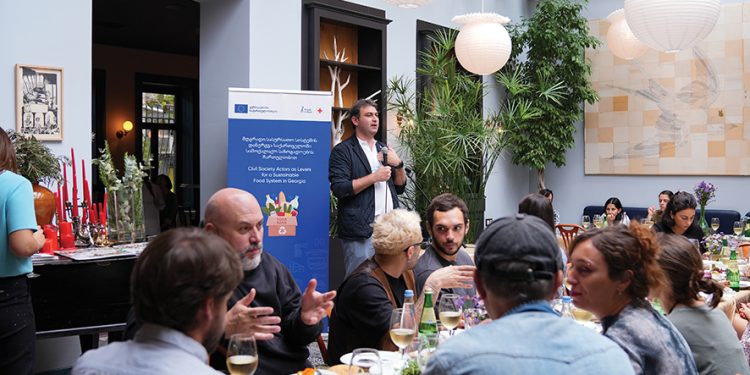In Georgia, an estimated 600,000 tons of food go to waste annually, much of that ending up in municipal landfills. A new project aims to change that by providing legal incentives for businesses to donate food rather than discarding it, and raising awareness among consumers of how to consume better and waste less.
On September 27, key players in Georgia’s HORECA (Hotel, Restaurant, and Café) industry gathered for the first ever ‘Zero-Waste Lunch’ at Ninia’s Garden in Tbilisi, an event aimed at highlighting the need to reduce food waste and introducing the country’s pilot food bank. Organized by NGOs People in Need and Parki Ar Minda, alongside the Food and Agriculture Organization of the United Nations (FAO) in Georgia, this initiative is part of a broader campaign titled ‘Food Bank Georgia: Reducing Food Waste, Increasing Food Security.’
A tool of survival for vulnerable families in many Western countries, food banks are non-profit organizations dedicated to providing food to individuals and families who struggle to afford enough to meet their nutritional needs. The Georgian model for the food bank initiative draws inspiration from successful long-term programs in Belgium and France, with a study tour to these countries having informed the project’s development.
Salome Japaridze, Project Coordinator at People in Need (PIN), shared details about the logistics of the food bank initiative with GEORGIA TODAY. “A central hub in Tbilisi will accept and sort dry food products [tinned goods, grains, oil, etc. – classed as “low risk”] donated by retailers, including major supermarkets, before distributing them to regional warehouses. Our pilot project will launch in Tskhaltubo municipality, supported by volunteers from Red Cross Georgia and the local mayor’s office,” she explained.
Tskhaltubo was chosen by PIN as the pilot site due to its community needs and potential for impact.
“The list of beneficiaries will be gender-inclusive, compiled by the municipal office,” Japaridze says. “Our hope is that once the pilot is established, we can expand to other municipalities.”
An essential aspect of this initiative is fostering a culture of awareness around food insecurity, with an emphasis on eliminating the stigma associated with seeking assistance. Japaridze emphasized, “We will conduct an awareness-raising campaign in Tskhaltubo to ensure beneficiaries feel no shame in accessing food bank services. This involves engaging local schools and supporting local NGOs in training and presentations.”
A critical timeline for the initiative sees changes to Georgia’s tax codes set to take effect on January 1, 2025, while relevant legislation will come into force on January 25.
The FAO has been instrumental in shaping this initiative since it began discussions with the Ministry of Agriculture in 2019. “We found that the concept of food waste and redistribution via food banks was largely unknown in Georgia,” Jumber Maruashvili, Senior National Policy Advisor at FAO, noted. “Previous donation efforts were informal, and there was no systematic approach or legal framework to support these initiatives. Our goal was to create a foundation for a sustainable food donation system.”

He elaborated, “The waste generated by retailers is staggering—up to 20 million GEL each year, which is simply unacceptable. Our research indicates a strong willingness among major retailers to get involved. We looked to Brussels and France for inspiration, as they really are champions in the field. France has operated food banks since the 1990s, making them leaders in food donation, although it wasn’t until 2018 that they implemented the necessary legislation, part of which includes governmental funds dedicated to food banks. Although we’re not currently asking the Georgian government for budget allocations, we are seeking essential political support from them.”
By removing VAT and income tax on food donations, retailers will face no costs for contributing, which not only helps minimize waste, but also bolsters their corporate social responsibility (CSR) reputation.
“The law clearly defines the responsibilities of state institutions, after which came the necessary decrees and bylaws to establish effective donation procedures and ensure food safety,” Maruashvili tells GEORGIA TODAY. “Authorization from the National Food Agency is vital; food banks will be classified as food business operators and will be subject to inspections to uphold quality standards. At this stage, Georgia doesn’t have the infrastructure to have the food banks handle higher-risk products like meat and dairy, and the process of elaboration will be long. But we’ve been working to align with societal expectations, and, encouragingly, we’ve encountered zero negative feedback—this initiative even garnered bipartisan support in parliament!”
The Zero-Waste Lunch, co-hosted by Meriko Gubeladze, a leading advocate for sustainable dining, also served as a platform for chefs and hospitality representatives to rally around the urgent need for food waste reduction. “This initiative not only aims to tackle food waste, but also to promote sustainable practices across our industry,” Gubeladze stated.
As the pilot project begins to take shape, the commitment from Georgia’s government, HORECA and retail sectors signals a pivotal shift towards a more sustainable future, where food waste reduction and community support go hand in hand.














